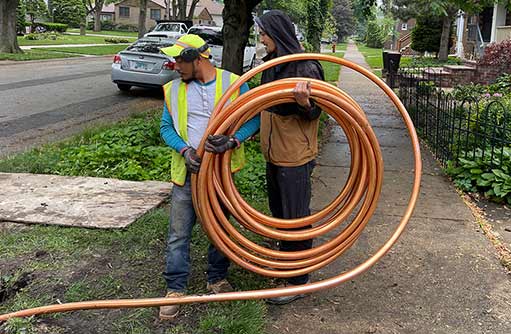
Problems in a home’s main water line are uncommon, but when they happen, they can disrupt the entire building’s plumbing system. The main water line is the central pipeline that supplies fresh water from the water company to the plumbing fixtures in your home.
Without a functioning main water line, your home’s plumbing, though existent, is practically useless. That is why the Foothills Properties team advises that principal care must be taken when treating the issues in your water line. If this is not done, the problems could result in even more expensive damage.
What are the common causes of a broken water main?
High water pressure
Excessive water pressure from the municipal water supply can wreak havoc on your main water line by causing what is known as a “water hammer.” Water hammers can exert enormous force on pipes and damage them.
Extreme temperature changes
This is a huge problem in homes where the main water line is less than four feet below the ground surface. It is also an issue in homes that are on a higher elevation.
Tree root intrusion
If there are trees and shrubs with invasive root systems near the location of the main water line, they can penetrate the pipe and damage it.
Soil movements
Changes in the arrangement of soil surrounding the main water line can cause it to fracture. These powerful soil movements are caused by natural activities or poor construction practices.
Aging
Problems in the main water line are also caused by aging pipes. But before your main water line collapses due to the age of the pipes, there would have been telltale signs of the problem.
If you have determined that your main water line (or a section) is damaged beyond repair and should be replaced, what do you need to know when replacing the line?
5 important considerations when replacing your water line
Replacing the water line is a major project that can impair the water quality entering your home if done wrong. It is also a disruptive project since the house will be without water throughout the entire period. That is why careful planning is needed when replacing your water line.
Assessing the damage
The extent of damage determines the scope and duration of the repairs. The following clues can help you assess the problem:
- Is the water flow steady or sporadic?
- Is there a sudden decrease in water pressure or a complete loss of water supply?
- Is there evidence of water pooling in your yard?
In addition to assessing the problem, you need to take stock of other existing issues in the water line so you can solve all the problems at once.
Determine the cost of repair
Replacing a damaged main water line is not cheap. Before you embark on the project, ensure you have a realistic cost estimate. Factors that play a role in the total cost of your project include the length of the water line or the section that needs to be replaced, how deep the pipes are buried, how easy or difficult the pipes are to access, and labor costs. Another factor that will affect your cost is the materials you use.
Selecting your materials
One of the reasons you are being forced to replace your water line is probably the kind of pipes in the current water line. To ensure long-term durability and performance, you must use materials that will stand the test of time. These materials should be resilient enough to resist whatever problems damage the existing line. Piping materials to consider are copper, PEX and PVC. Understand the pros and cons of each material before you make your choice.
Hiring a professional
The professional you hire should have a track record of success with this project. Avoid hiring a contractor without first screening them. The top qualities you want to look out for in an expert are experience and up-to-date knowledge, state-of-the-art equipment and modern techniques, impeccable safety record, efficient problem-solving, speed of delivery, and transparent costing.
Minimizing disruption
Replacing your water line will interrupt your home’s access to water. It will disrupt the household’s day-to-day life. Although this is unavoidable, you can minimize the impact. It all depends on the time and details that go into planning the project. It is essential to have all your materials on the ground before you begin. The need to minimize the disruption caused by the project is an additional reason to hire a competent professional.
To conclude, planning is crucial when replacing your main water line, but it is almost impossible – unless you are an expert – to plan effectively without a professional. That is why the most essential factor in the success of your project is the contractor you hire.


